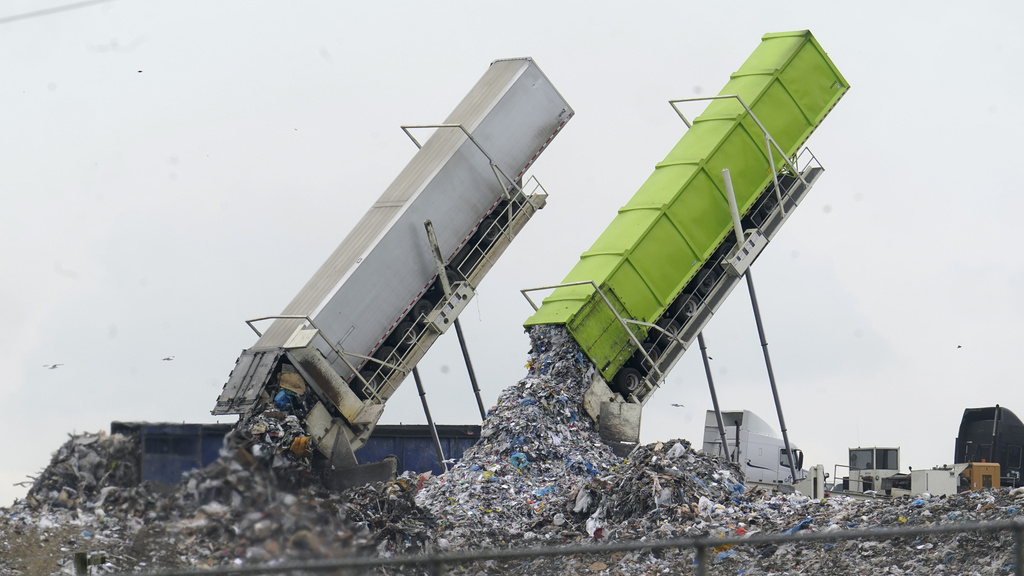The world wasted an estimated 19% of the food produced globally in 2022, or about 1.05 billion metric tons, according to a new United Nations report.
The U.N. Environment Programme’s Food Waste Index Report, published Wednesday, tracks the progress of countries to halve food waste by 2030.
The U.N. said the number of countries reporting for the index nearly doubled from the first report in 2021. The 2021 report estimated that 17% of the food produced globally in 2019, or 931 million metric tons (1.03 billion tons), was wasted, but authors warned against direct comparisons because of the lack of sufficient data from many countries.
The report is co-authored by UNEP and Waste and Resources Action Programme (WRAP), an international charity.
Researchers analyzed country data on households, food service and retailers. They found that each person wastes about 79 kilograms (about 174 pounds) of food annually, equal to at least 1 billion meals wasted worldwide daily.
Most of the waste — 60% — came in households. About 28% came from food service, or restaurants, with about 12% from retailers.
“It is a travesty,” said co-author Clementine O’Connor, the focal point for food waste at UNEP. “It doesn’t make any sense, and it is a complicated problem, but through collaboration and systemic action, it is one that can be tackled.”
The report comes at a time when 783 million people around the world face chronic hunger and many places facing deepening food crises.
Food waste is also a global concern because of the environmental toll of production, including the land and water required to raise crops and animals and the greenhouse gas emissions it produces, including methane, a powerful gas that has accounted for about 30 percent of global warming since pre-industrial times.
Food loss and waste generates 8 to 10 percent of global greenhouse gas emissions. If it were a country, it would rank third after China and the U.S.
Fadila Jumare, a Nigeria-based project associate at Busara Center for Behavioral Economics who has studied prevention of food waste in Kenya and Nigeria, said the problem further disadvantages many people who are already food insecure and cannot afford healthy diets.
“For humanity, food waste means that less food is available to the poorest population,” said Jumare, who wasn’t involved in the report.
Brian Roe, a food waste researcher at Ohio State University who wasn’t involved with the report, said the index is important to tackling food waste.
“The key takeaway is that reducing the amount of food that is wasted is an avenue that can lead to many desirable outcomes — resource conservation, fewer environmental damages, greater food security, and more land for uses other than as landfills and food production,” said Roe, who wasn’t involved in the report.
The report showed notable growth in coverage of food waste in low- and middle-income countries, the authors said. But it may fall to wealthier nations to lead in international cooperation and policy development to reduce food waste, they said.
The report said many governments, regional and industry groups are using public-private partnerships to reduce food waste and its contributions to climate and water stress. Governments and municipalities collaborate with businesses in the food supply chain, whereby businesses commit to measure food waste.
The report said food redistribution — including donating surplus food to food banks and charities — is significant in tackling food waste among retailers.
One group doing that is Food Banking Kenya, a nonprofit that gets surplus food from farms, markets, supermarkets and packing houses and redistributes it to schoolchildren and vulnerable populations. Food waste is an increasing concern in Kenya, where an estimated 4.45 million tons of food is wasted every year.
“We positively impact the society by providing nutritious food and also positively impact the environment by reducing the emission of harmful gases,” said John Mukuhi, the group’s co-founder and executive director.
The report’s authors said they found that the differences in per capita household food waste between high-income and lower-income countries were surprisingly small.
Richard Swannel, a co-author and director of Impact Growth at WRAP, said that shows food waste “is not a rich world problem. It’s a global problem.”
“The data is really clear on this point: that here is a problem right around the world and one that we could all tackle tomorrow to save ourselves money and reduce environmental impact,” he said.
(AP)












2 Responses
Lots of information in this article. But it seems to be withoiut practical value. Suppose there are 5 leftover portions of food from Shabbos? Just how does this surplus get to the hungry and starving in Biafra? Combining these numbers, the waste and the numbers of hungry people, is erroneous. Now there are things that can be done. The principle of עניי עירך is particularly relevant. Yes, bakeries, restaurants, wedding halls, and take out establishments should have mechanisms whereby the food that would otherwise be waste is provided to those who need. It would be difficult to create a perfect system, but there is much already being done in this regard, and perhaps there is more. But the global issue is not related to the extra portions in our homes. I wish those reporting would up their levels of honesty and relevance.
The leading cause of famine is the government. For starters, they settle disputes by having wars, which interfere with food production and distribution. Many countries ban modern farming techniques such as used of technological improved organism, and ban such food from international trade – thus you see Africans going country since the EU bans them from using modern sciences since if they do, all their exports will be banned from Europe.